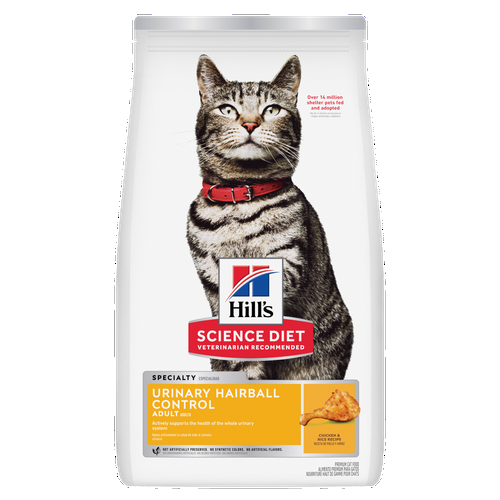
-
Find the right food for your petTake this quiz to see which food may be the best for your furry friend.Find the right food for your petTake this quiz to see which food may be the best for your furry friend.Featured products
 Adult 7+ Small & Mini Chicken & Brown Rice Recipe Dog Food
Adult 7+ Small & Mini Chicken & Brown Rice Recipe Dog FoodFor the unique nutritional needs of mature Small & Mini dogs
Shop Now Adult Small & Mini Lamb Meal & Brown Rice Recipe Dog Food
Adult Small & Mini Lamb Meal & Brown Rice Recipe Dog FoodFor the faster metabolism of Small & Mini dogs
Shop Now Hill's Science Diet Adult Oral Care Chicken, Brown Rice & Barley Recipe Dog Food
Hill's Science Diet Adult Oral Care Chicken, Brown Rice & Barley Recipe Dog FoodClinically proven kibble technology to reduce plaque & tartar build-up
Shop NowFeatured products Adult Urinary Hairball Control Chicken & Rice Recipe Cat Food
Adult Urinary Hairball Control Chicken & Rice Recipe Cat FoodActively supports the health of the whole urinary system
Shop Now Hill's Science Diet Adult Sensitive Stomach & Skin Dog Food
Hill's Science Diet Adult Sensitive Stomach & Skin Dog FoodHighly digestible recipe, gentle on stomachs. Nourishes skin & promotes a lustrous coat
Shop Now Adult Indoor Chicken Recipe Cat Food
Adult Indoor Chicken Recipe Cat FoodSupports energy level and beautiful fur in indoor cats
Shop Now -
Featured articles
 Easy DIY Dog & Cat Toys: Nine of Our Favorites
Easy DIY Dog & Cat Toys: Nine of Our FavoritesBrowse this comprehensive guide for several of our favorite DIY dog and cat toys that are sure to put a little pep in your pet's step.
Read More My Pet Ate a Lizard — What Should I Do?
My Pet Ate a Lizard — What Should I Do?Learn what to do if your pet eats a lizard, including whether they can be toxic and symptoms to keep an eye on when they've swallowed one.
Read More 15 Pet-Friendly Cities Ideal for a US Road Trip
15 Pet-Friendly Cities Ideal for a US Road TripCheck out our list of pet-friendly U.S. cities that are excellent travel options, offering off-leash dog parks and pet-friendly restaurants & hotels.
Read More -


If you've ever walked your dog during the wee hours of the night, you may have wondered, "Can dogs see in the dark?" Perhaps you've even asked, "Do dogs have night vision?"
As a pet parent, you want to keep your furry family member safe and comfortable when you walk them during the nighttime. Knowing the answers to these questions can make all the difference. Let's take a closer look at how your dog's vision works so that you know whether or not they're safe when the lights are low or off completely.
Can Dogs See in the Dark?
There's no need to worry — your dog can see in the dark. It's safe to take your pet for a stroll in the evening hours or let them roam around your house unsupervised at night. In fact, your dog's vision, in some instances, is better than a human's would be. However, dogs are more nearsighted than their human counterparts, and they see fewer shades of colors when processing visual objects.
Wondering how it all works? The structure of your dog's eyes is what makes them able to see in the dark — their large pupils allow them to let in more light. Because of the additional rods in their eyes, dogs are able to tell the difference between light and shadow. Dogs also have a membrane along the rear of their eyes called tapetum lucidum, which, according to Animal Planet, "allows light that is not absorbed by the rods to rebound to the retina, letting it take in more light, which enables the dog to see better."
So, the answer to "do dogs have night vision?" is yes. Your dog should be well-equipped to handle the late-night hours if you bring them for an evening ride or they decide to sleep in another room in the middle of the night. Who knows, maybe your dog will even see ghosts in the night!
Do All Dogs Have Great Vision?
Yes, but some dogs may be born with certain eye issues or develop problems with their sight later on.
While dogs generally do have great vision, some breeds — such as greyhounds and whippets — may see differently than others simply due to the positioning of the dog's snout and eyes, which may make their vision slightly different from others. Similarly, some dogs may develop problems with their vision due to an illness, injury, aging or even from a hereditary issue.
According to Memphis Veterinary Specialists and Emergency, " ... your dog's natural aging process can sometimes include vision loss, ranging from minor issues to complete blindness." They continue, "It's important for pet parents to understand that occasionally blindness itself isn't the primary issue, but rather a symptom of an underlying condition, such as heart disease, kidney or liver disorders or systemic diseases."


Tasty Tips
Are Dogs Able to See Colors?
As you're considering your pet's night vision, you may also wonder whether everything they see is in black and white. Although that was a long-held belief, dogs actually are able to see in color — but they are unable to see reds and greens, due to their processing of the color spectrum. That said, this won't affect them much while in the dark. At night, no one's vision is very crisp when it comes to making out colors.
Now, there's no need to worry or question whether dogs can see in the dark. Still, if you're concerned about a pet whose vision seems to decrease whether it's night or day, it's best to reach out to your veterinarian to check your dog's overall health.


Erin Ollila believes in the power of words and how a message can inform—and even transform—its intended audience. Her writing can be found all over the internet and in print, and includes interviews, ghostwriting, blog posts, and creative nonfiction. Erin is a geek for SEO and all things social media. She graduated from Fairfield University with an M.F.A. in Creative Writing. Reach out to her on Twitter @ReinventingErin or learn more about her at http://erinollila.com.
Related products

Improves everyday ability to get up & go

Clinically proven kibble technology to reduce plaque & tartar build-up

For the unique nutritional needs of mature Small & Mini dogs

For the faster metabolism of Small & Mini dogs
Related articles

Discover how the field of dog science is giving us more and more insights into the inner workings of our furry best friends.

Learn basic steps & precautions for treating a cut on your dog, including what you can put on the cut, and when you should take them to the vet.

Understand the role that Omega-6 and Omega-3 fatty acids play in your dog's overall health, and how you can ensure they are getting enough.

Your dog's coat and skin are a big part of your dog's overall health. Ensure you keep your dog's coat healthy, by following these simple tips.

Put your dog on a diet without them knowing
Our low calorie formula helps you control your dog's weight. It's packed with high-quality protein for building lean muscles, and made with purposeful ingredients for a flavorful, nutritious meal. Clinically proven antioxidants, Vitamin C+E, help promote a healthy immune system.
Put your dog on a diet without them knowing
Our low calorie formula helps you control your dog's weight. It's packed with high-quality protein for building lean muscles, and made with purposeful ingredients for a flavorful, nutritious meal. Clinically proven antioxidants, Vitamin C+E, help promote a healthy immune system.

